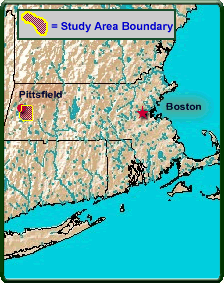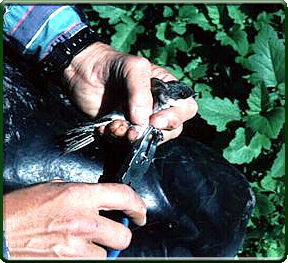Upper Midwest Environmental Sciences Center
|
|
| Home/ Overview/ Science Programs/ Data Library/ Products and Publications/States/ Rivers/Teachers and Students/ Links/ Contact/ Search |
Adult Tree Swallow (Tachycineta bicolor) Survival on the PCB-contaminated Housatonic River, Massachusetts
 Scientists do not presently know if chronic exposure to environmental
contaminants is associated with decreased adult survival. Determining
whether there is a relation between contaminants and adult survival
and understanding the nature of that relation would represent a
major advance in assessing the risk of contaminants to bird populations.
Scientists do not presently know if chronic exposure to environmental
contaminants is associated with decreased adult survival. Determining
whether there is a relation between contaminants and adult survival
and understanding the nature of that relation would represent a
major advance in assessing the risk of contaminants to bird populations.
The Housatonic River in Berkshire County, Massachusetts, is extremely contaminated with polychlorinated biphenyls (PCBs) and offers an opportunity to test this question.
 Tree swallows are a good species to study because they exhibit
a high degree of nest site philopatry, are relatively easy to capture
in the nest box, are amenable to handling and banding, and have
a relatively short life span. Additionally, a number of banding
studies have already been done, so some baseline data are available.
Tree swallows are a good species to study because they exhibit
a high degree of nest site philopatry, are relatively easy to capture
in the nest box, are amenable to handling and banding, and have
a relatively short life span. Additionally, a number of banding
studies have already been done, so some baseline data are available.
The objective of this study is to determine whether PCBs are affecting adult survival in a highly PCB-contaminated environment.
We will do this by banding all female tree swallows at existing study sites along the Housatonic River, and at a nearby reference site annually for 5 years. Capture-recapture models will then be used to estimate state-specific and site-specific survival and capture probabilities for females.
This project was terminated in September 2001.
Principal Investigator: Christine Custer



